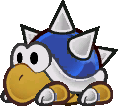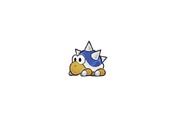Sky-Blue Spiny: Difference between revisions
m (Text replacement - "\| *((Jap|Ara|Arm|Bos|Bul|Cat|Chi|ChiS|ChiT|Cro|Cze|Dan|Dut|Est|Fin|Fre|FreA|FreE|Geo|Ger|Gre|Heb|Hin|Hun|Ice|Ind|Ita|Kor|Lat|Lit|Mac|Mal|Nor|Pol|Por|PorA|PorE|Rom|Rus|Ser|SerCro|Svk|Svn|Spa|SpaA|SpaE|Swe|Tha|Tur|Ukr|Vie)\d*) *= *([^\n]+) *<small>\(([^\n\(\)]+)\)<\/small>\n" to "|$1=$3 |$1N=$4 ") |
|||
| (92 intermediate revisions by 64 users not shown) | |||
| Line 1: | Line 1: | ||
[[ | {{species infobox | ||
'' | |image=[[File:SkyblueSpiny.png|150px]]<br>Sprite from ''Paper Mario: The Thousand-Year Door'' | ||
|first_appearance=''[[Paper Mario: The Thousand-Year Door]]'' ([[List of games by date#2004|2004]]) | |||
|latest_appearance=''[[Paper Mario: The Thousand-Year Door (Nintendo Switch)|Paper Mario: The Thousand-Year Door]]'' ([[Nintendo Switch]]) ([[List of games by date#2024|2024]]) | |||
|variant_of=[[Spiny]] | |||
}} | |||
'''Sky-Blue Spinies''' (or '''S. Blue Spinies''') are variants of [[Spiny|Spinies]] that are seen in ''[[Paper Mario: The Thousand-Year Door]]'' and its [[Paper Mario: The Thousand-Year Door (Nintendo Switch)|Nintendo Switch remake]]. They are thrown by [[Dark Lakitu]]s and can be found on floors 61-70 of the [[Pit of 100 Trials (Paper Mario: The Thousand-Year Door)|Pit of 100 Trials]]. They are stronger than normal Spinies and can [[Charged|charge]]. They can sometimes curl up and hide in their shell, making them impervious to any attack, even those that bypass defense. | |||
Their body structure is the same as an ordinary Spiny, except instead of red, their shells are blue similar to the [[Spiny Shell (blue)|Spiny Shell]]s in the ''[[Mario Kart (series)|Mario Kart]]'' series. Additionally, their skin is slightly darker like the [[Dark Lakitu]]s that throw them. This gives them a resemblance to [[Buzzy Beetle]]s, so much so that the German version of the game refers to them as "''Käfer-Stachis''", meaning "Buzzy Beetle Spinies". However, they lack the usual qualities of Buzzy Beetles, such as resilience to fire. | |||
In the English version of the original game, it is mistakenly stated that Dark Lakitu's Sky-Blue Spinies hatch from "pipes" in [[Goombella]]'s [[Tattle]] for both enemies. However, the supposed "pipes" which spawn Sky-Blue Spinies are actually regular blue Spiny Eggs. Their name is the result of a mistranslation: Spiny Eggs are referred to as 「パイポ」 ''Paipo'' in Japanese, which comes from [[Wikipedia:Jugemu|a well-known Japanese folktale]]<ref>{{cite|url=legendsoflocalization.com/super-mario-bros/names/#the-eggs-too|title=''Super Mario Bros.'': Names|language=en|publisher=Legends of Localization|accessdate=May 24, 2024}}</ref> but can also be interpreted (incorrectly, in this case) as an approximation of the English word "pipe" into Japanese [[Wikipedia:Katakana|katakana]]. Despite this mistranslation, 「パイポ」 ''Paipo'' is correctly translated as "Spiny Egg" elsewhere in the English text of ''Paper Mario: The Thousand-Year Door'', namely with regard to the standard species of Spiny fought in the game.<ref>{{cite|url=legendsoflocalization.com/that-one-time-lakitu-started-throwing-pipes|title=That One Time Lakitu Started Throwing Pipes|publisher=Legends of Localization|accessdate=November 5, 2017|language=en}}</ref> This was fixed in the remake, which correctly refers to them as Spiny Eggs. | |||
==Profiles and statistics== | |||
===''Paper Mario: The Thousand-Year Door''=== | |||
====GameCube==== | |||
{{:Paper Mario: The Thousand-Year Door bestiary|transcludesection=Sky-Blue Spiny|align=horizontal|image=[[File:SkyblueSpiny.png]]}} | |||
====Nintendo Switch==== | |||
{{:Paper Mario: The Thousand-Year Door (Nintendo Switch) bestiary|transcludesection=Sky-Blue Spiny|align=horizontal}} | |||
==Names in other languages== | |||
{{foreign names | |||
|Jap=ソライロトゲゾー | |||
|JapR={{nw|Sora-iro Togezō}} | |||
|JapM=Sky-blue Spiny | |||
|ChiS=蔚蓝色刺刺龟 | |||
|ChiSR=Wèilánsè Cì Cì Guī | |||
|ChiSM=Sky-blue Spiny | |||
|ChiT=蔚藍色刺刺龜 | |||
|ChiTR=Wèilánsè Cì Cì Guī | |||
|ChiTM=Sky-blue Spiny | |||
|Fre=Hériss Bleu | |||
|FreM=Blue Spiny | |||
|Ger=Käfer-Stachi | |||
|GerM=Buzzy Beetle Spiny | |||
|Ita=Mini Koopistrice | |||
|ItaN=original | |||
|Ita2=Koopistrice celeste | |||
|Ita2N=remake | |||
|ItaM=Mini Spiny | |||
|Ita2M=Sky-Blue Spiny | |||
|Kor=하늘색가시돌이 | |||
|KorR=Haneulsaeg Gasidori | |||
|KorM=Sky-blue Spiny | |||
|SpaA=Picudo Celeste | |||
|SpaAM=Sky-Blue Spiny | |||
|SpaE=Pinchón Celeste | |||
|SpaEM=Sky-Blue Spiny | |||
}} | |||
==References== | |||
<references/> | |||
{{Spinies}} | {{Spinies}} | ||
{{PMTTYD}} | |||
[[Category: | [[Category:Spinies]] | ||
[[Category: | [[Category:Paper Mario: The Thousand-Year Door enemies]] | ||
[[ | [[de:Käfer-Stachi]] | ||
[[it:Mini Koopistrice]] | |||
Latest revision as of 07:46, August 28, 2024
| Sky-Blue Spiny | |
|---|---|
 Sprite from Paper Mario: The Thousand-Year Door | |
| First appearance | Paper Mario: The Thousand-Year Door (2004) |
| Latest appearance | Paper Mario: The Thousand-Year Door (Nintendo Switch) (2024) |
| Variant of | Spiny |
Sky-Blue Spinies (or S. Blue Spinies) are variants of Spinies that are seen in Paper Mario: The Thousand-Year Door and its Nintendo Switch remake. They are thrown by Dark Lakitus and can be found on floors 61-70 of the Pit of 100 Trials. They are stronger than normal Spinies and can charge. They can sometimes curl up and hide in their shell, making them impervious to any attack, even those that bypass defense.
Their body structure is the same as an ordinary Spiny, except instead of red, their shells are blue similar to the Spiny Shells in the Mario Kart series. Additionally, their skin is slightly darker like the Dark Lakitus that throw them. This gives them a resemblance to Buzzy Beetles, so much so that the German version of the game refers to them as "Käfer-Stachis", meaning "Buzzy Beetle Spinies". However, they lack the usual qualities of Buzzy Beetles, such as resilience to fire.
In the English version of the original game, it is mistakenly stated that Dark Lakitu's Sky-Blue Spinies hatch from "pipes" in Goombella's Tattle for both enemies. However, the supposed "pipes" which spawn Sky-Blue Spinies are actually regular blue Spiny Eggs. Their name is the result of a mistranslation: Spiny Eggs are referred to as 「パイポ」 Paipo in Japanese, which comes from a well-known Japanese folktale[1] but can also be interpreted (incorrectly, in this case) as an approximation of the English word "pipe" into Japanese katakana. Despite this mistranslation, 「パイポ」 Paipo is correctly translated as "Spiny Egg" elsewhere in the English text of Paper Mario: The Thousand-Year Door, namely with regard to the standard species of Spiny fought in the game.[2] This was fixed in the remake, which correctly refers to them as Spiny Eggs.
Profiles and statistics[edit]
Paper Mario: The Thousand-Year Door[edit]
GameCube[edit]
| Paper Mario: The Thousand-Year Door enemy | ||||||||
|---|---|---|---|---|---|---|---|---|
| S. Blue Spiny | ||||||||

|
Max HP | 6 | Attack | 6 | Defense | 4 | ||
| Location(s) | Pit of 100 Trials (Levels 61, 64-66, 69) | Role | Common | Level | 22 | |||
| Sleep? | 60% | Dizzy? | 60% | Confuse? | 60% | |||
| Tiny? | 85% | Stop? | 70% | Soft? | 90% | |||
| Burn? | 100% | Freeze? | 50% | Fright? | 80% | |||
| Gale Force? | 10% | KO? | 50% | Moves | Spikeball Shot (6), Ball Up (Raises Defense to ???), Charge Up (ATK+6), Superball Shot (12) | |||
| Exp. points | 0 | Coins | 0 - 1 | Items | None | |||
| Tattle Log #: 30 |
Log | Spawned from a pipe thrown by Dark Lakitu, it will charge at you. When it's balled up, your attacks won't work. | ||||||
| Tattle | That's a Sky-Blue Spiny. It appeared from a pipe thrown by the Dark Lakitu. Max HP is 6, Attack is 6, and Defense is 4. It'll totally charge at you! Sometimes it balls up to defend and store energy for an attack. If you can, beat it and any buddies it may have with a special attack. | |||||||
Nintendo Switch[edit]
| Paper Mario: The Thousand-Year Door enemy | ||||||||
|---|---|---|---|---|---|---|---|---|
| Sky-Blue Spiny | ||||||||

|
Max HP | 6 | Attack | 6 | Defense | 4 | ||
| Location(s) | Pit of 100 Trials (Levels 61, 64-66, 69) | Role | Common | Level | 22 | |||
| Sleep? | 60% | Dizzy? | 60% | Confuse? | 60% | |||
| Tiny? | 85% | Stop? | 70% | Soft? | 90% | |||
| Burn? | 100% | Freeze? | 50% | Fright? | 80% | |||
| Gale Force? | 10% | KO? | 50% | Moves | Spikeball Shot (6), Ball Up (Raises Defense to ???), Charge Up (ATK+6), Superball Shot (12) | |||
| Exp. points | 0 | Coins | 0 - 1 | Items | None | |||
| Tattle Log #: 31 |
Log | Spawned from a Spiny Egg thrown by Dark Lakitu, it will charge at you. When it's balled up, your attacks won't work. | ||||||
| Tattle | That's a Sky-Blue Spiny. It appeared from a Spiny Egg thrown by the Dark Lakitu. Max HP is 6, Attack is 6, and Defense is 4. It'll totally charge at you! Sometimes it balls up to defend and store energy for an attack. If you can, beat it and any buddies it may have with a special move. | |||||||
Names in other languages[edit]
| Language | Name | Meaning | Notes |
|---|---|---|---|
| Japanese | ソライロトゲゾー[?] Sora-iro Togezō |
Sky-blue Spiny | |
| Chinese (simplified) | 蔚蓝色刺刺龟[?] Wèilánsè Cì Cì Guī |
Sky-blue Spiny | |
| Chinese (traditional) | 蔚藍色刺刺龜[?] Wèilánsè Cì Cì Guī |
Sky-blue Spiny | |
| French | Hériss Bleu[?] | Blue Spiny | |
| German | Käfer-Stachi[?] | Buzzy Beetle Spiny | |
| Italian | Mini Koopistrice[?] | Mini Spiny | original |
| Koopistrice celeste[?] | Sky-Blue Spiny | remake | |
| Korean | 하늘색가시돌이[?] Haneulsaeg Gasidori |
Sky-blue Spiny | |
| Spanish (NOA) | Picudo Celeste[?] | Sky-Blue Spiny | |
| Spanish (NOE) | Pinchón Celeste[?] | Sky-Blue Spiny |
References[edit]
- ^ Super Mario Bros.: Names. Legends of Localization (English). Retrieved May 24, 2024.
- ^ That One Time Lakitu Started Throwing Pipes. Legends of Localization (English). Retrieved November 5, 2017.
| Spinies | |
|---|---|
| Characters | Kyodai Togemetto • Spike Storm |
| Species | Big Spiny • Dark Spiny • Paper Spiny • Piranha Pod • Sad Spiny • Sharpea • Sky-Blue Spiny • Spike Blop • Spike Koopa • Spikester • Spikey • Spiny • Spiny Egg • Spiny R • Spiny Shroopa • Thorny • Urspike |
| Related items | Giant Spiny Shell • Spiny Orb • Spiny Shell (blue) • Spiny Shell (red) |